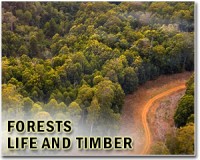 |
Milwaukee WI (SPX) Jun 30, 2010 What determines plant diversity in a forest? It's a question even Charles Darwin wanted to unravel. But most research into forest diversity demonstrates only patterns of species survival and abundance rather than the reason for them - until now. A team of researchers led by biologists at the University of Wisconsin-Milwaukee (UWM) has shown that soil-borne pathogens are one important mechanism that can maintain species diversity and explain patterns of tree abundance in a forest. The paper, "Negative plant-soil feedbacks predict tree-species relative abundance in a tropical forest," is published in the journal Nature. The lead authors are Scott Mangan, a UWM postdoctoral research associate, and Stefan Schnitzer, UWM associate professor of biological sciences. Other authors include Edward A. Herre and Evelyn I. Sanchez of the Smithsonian Tropical Research Institute, Keenan M.L. Mack and James D. Bever of Indiana University, and Mariana C. Valencia of the University of Illinois-Chicago. In a self-limiting process called "negative feedback," scientists have observed that the farther from the parent tree a seed falls, the better it fares. Negative feedbacks occur when juveniles growing near an adult of the same species are particularly vulnerable to the detrimental effects of enemies that accumulate in the soil near the adult tree. In both greenhouse and field experiments, the researchers found clues that tree species differ in their susceptibilities to enemies found in the soil, such as viruses, bacteria and fungi. The research reinforces the conclusion that certain tree species are abundant in forests because they are less susceptible to pathogens in the soil than rarer tree species, says Mangan. "Strong negative feedbacks with soil-borne pathogens prevent rare tree species from becoming abundant." The study has shown that more abundant tree species exhibit the weakest negative feedbacks - the opposite of what the team expected, says Schnitzer. And when the team scaled up the empirical data using simulation models they created, they found the same relationship between negative feedbacks and abundance. The next step for the research team is to isolate the exact pathogens that are so powerful against each species. Using a genomics approach, they will examine how soil varies in the plant populations. Schnitzer emphasizes that the work describes what could be one of many mechanisms that determine species abundance in forests. "We don't claim that because we found evidence of one mechanism, that there aren't others that also could be at work, but we know that this one is probably very important."
Share This Article With Planet Earth
Related Links University of Wisconsin - Milwaukee Forestry News - Global and Local News, Science and Application
 New Brazil mill responds to surging demand
New Brazil mill responds to surging demandRio De Janeiro (UPI) Jun 22, 2010 Brazil opened a new steel mill in an outlying area of Rio de Janeiro as global figures showed steel output surged in response to growing demand and could go up further. The $6.5 billion venture, Cia Siderurgica do Atlantico, the largest private sector investment in 15 years, brings together mining giant Vale Doce and ThyssenKrupp. President Luiz Inacio Lula da Silva marked the e ... read more |
|
| The content herein, unless otherwise known to be public domain, are Copyright 1995-2010 - SpaceDaily. AFP and UPI Wire Stories are copyright Agence France-Presse and United Press International. ESA Portal Reports are copyright European Space Agency. All NASA sourced material is public domain. Additional copyrights may apply in whole or part to other bona fide parties. Advertising does not imply endorsement,agreement or approval of any opinions, statements or information provided by SpaceDaily on any Web page published or hosted by SpaceDaily. Privacy Statement |